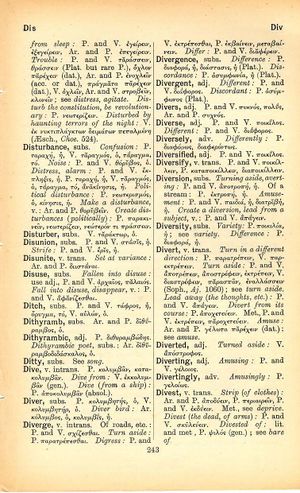divert: Difference between revisions
From LSJ
θεωρεῖται δὲ ἀνοησίᾳ κρείττονι νοήσεως → it is grasped only by means of an ignorance superior to intellection, it may be immediately cognised only by means of a non-intellection superior to intellection
(Woodhouse 2) |
(CSV4) |
||
| Line 1: | Line 1: | ||
{{ | {{Woodhouse1 | ||
| | |Text=[[File:woodhouse_243.jpg|thumb|link={{filepath:woodhouse_243.jpg}}]]'''v. trans.''' | ||
<b class="b2">Turn in a different direction</b>: P. παρατρέπειν, V. παρεκτρέπειν. | |||
<b class="b2">Turn aside</b>: P. and V. ἀποτρέπειν, ἀποστρέφειν, ἐκτρέπειν, V. διαστρέφειν, παρασπᾶν, ἐναλλάσσειν (Soph., ''Aj.'' 1060); see [[turn aside]]. | |||
<b class="b2">Lead away</b> (the thoughts, etc.): P. and V. ἀπάγειν. | |||
<b class="b2">Divert from its course</b>: P. ἀποχετεύειν. Met., P. and V. ἐκτρέπειν, παροχετεύειν. | |||
<b class="b2">Amuse</b>: Ar. and P. γέλωτα [[παρέχω|παρέχειν]] (dat.): see [[amuse]]. | |||
}} | }} | ||
Revision as of 09:37, 21 July 2017
English > Greek (Woodhouse)
v. trans.
Turn in a different direction: P. παρατρέπειν, V. παρεκτρέπειν. Turn aside: P. and V. ἀποτρέπειν, ἀποστρέφειν, ἐκτρέπειν, V. διαστρέφειν, παρασπᾶν, ἐναλλάσσειν (Soph., Aj. 1060); see turn aside. Lead away (the thoughts, etc.): P. and V. ἀπάγειν. Divert from its course: P. ἀποχετεύειν. Met., P. and V. ἐκτρέπειν, παροχετεύειν. Amuse: Ar. and P. γέλωτα παρέχειν (dat.): see amuse.

